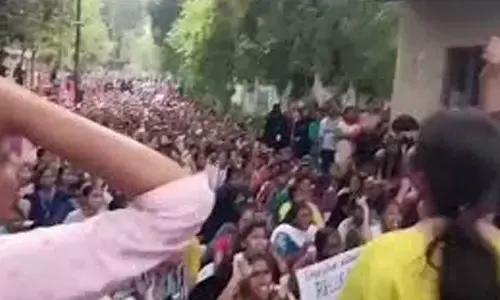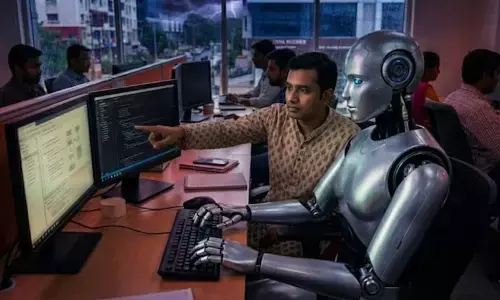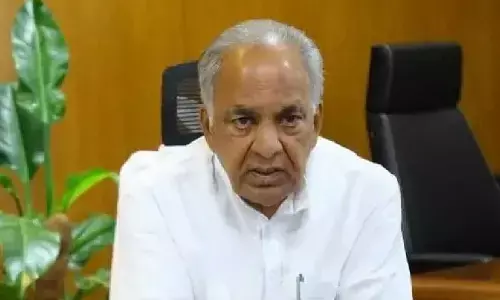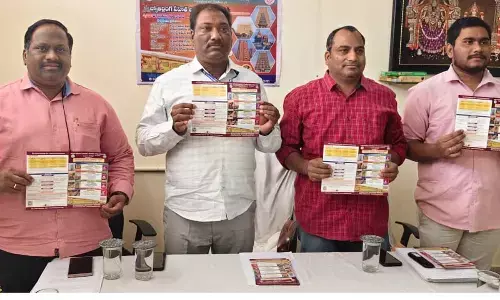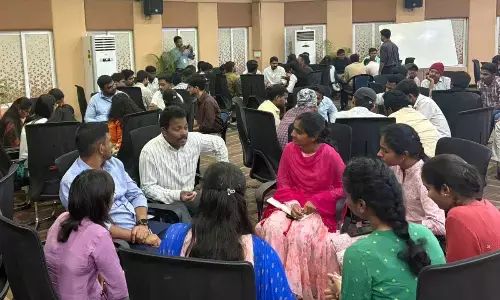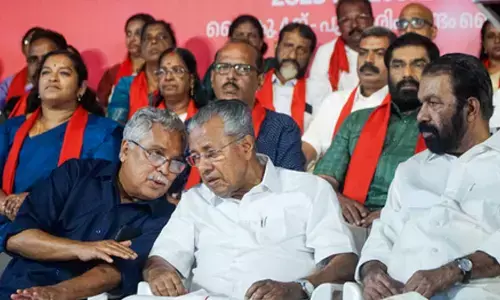The Good Luck Sparrows
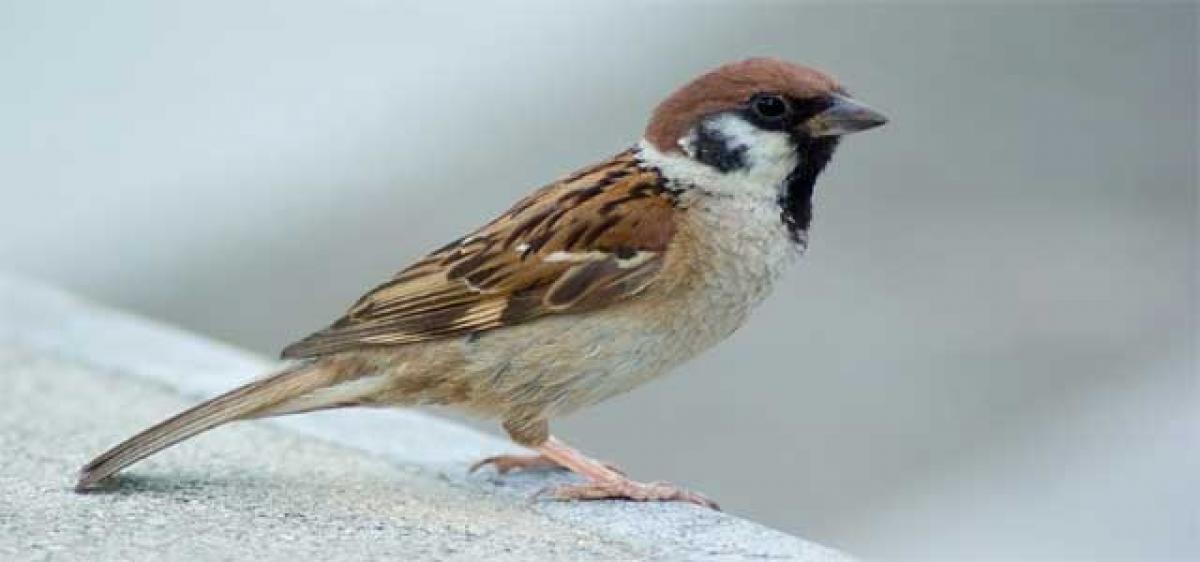
The house sparrow is one of the most commonly found bird species in urban cities. It is a small brown-coloured bird, with black streaks on its back. It is a social species, found in groups of eight to 10, chirping and chattering to communicate with each other.
The house sparrow is one of the most commonly found bird species in urban cities. It is a small brown-coloured bird, with black streaks on its back. It is a social species, found in groups of eight to 10, chirping and chattering to communicate with each other.
True to its love for urban spaces, the house sparrow is known to nest in buildings, finding crevices and holes in walls, or at best, using the bird houses and nest boxes put out by humans in their gardens.
It is known to live in close contact with humans, but the last two decades have been disastrous for the House Sparrow. Their population is on the decline in almost every city. The reasons are loss of natural grasslands/ green cover, concrete buildings that are unsuitable for its nesting, air and noise pollution, pesticides/insecticides and mobile network towers.
In 2012, Delhi adopted the House sparrow as its State bird, to spread awareness about the threat to the species.
Mohan was almost out of the front door of the house, clutching his exam pad and pencil box when he remembered something. He rushed back to his room, much to the chagrin of his mother. “Where are you going?” she cried. “It’s already late! Do you want a spanking from your father?” Mohan ignored her calls.
He hurriedly opened the sole window in his room, letting the morning sunlight flood in. He thrust his hand into a container kept nearby, and drew out a handful of grains, which he scattered on the window sill. “Come, sparrow brother!” he called.
He waited a few seconds. His heart filled with dread. Wouldn’t the sparrows come? But to his relief, a single brown sparrow landed on his window sill, and started pecking at the grains, not in the least abashed at Mohan’s presence.
Within a few minutes, several more had joined in the feast, and Mohan was satisfied. He rushed outside to go to school, while his mother grumbled in the kitchen. “Bye, Maa!!!” he called, and he was off like a rocket.
At the exam hall, the strict headmaster handed out the question papers to the students. It was Mohan’s most dreaded subject: Science. Oh, why didn’t the hateful headmaster invigilate the higher classes? Why was he always so keen on torturing the sixth standard students with his presence?
The Headmaster seemed to sense Mohan’s discomfort, and looked at him with beady eyes as he gave him the question paper. A few desks away, his friend Suresh was already scribbling away the answers. Mohan closed his eyes and took a deep breath. His friends, the sparrows, had responded to his call.
They had come and eaten the grain. Why should he worry then? He was sure to pass the exam. He slowly opened his eyes and had a look at the paper. The first question hit him like a bolt. “What are Villi? Explain its functions.” Mohan gulped.
His mother had always told him never to step back inside when setting out for something important. But he had gone back to feed the sparrows, his mascot for good luck. The sparrows were the only thing he was superstitious about. Had his mascot failed him?
His eyes wandered to another question. “What is Newton’s third law of motion?” Mohan started sweating. He couldn’t even remember his teacher talking about it in the class. Oh, what had he done to deserve such punishment?
Well, better to write something than give in an empty answer sheet, he reasoned with himself. Just as he was about to put pen to paper, a teacher hurried in, out of breath. “Students, questions 4, 5, 7, 9 and 10 are out of syllabus. Please note down these new questions…”
Mohan could hardly contain his delight. Now the paper seemed so easy! His sparrow friends had saved him after all. He said a silent prayer of thanks to them when he came out of the exam hall. His friend Suresh came over to speak to him, looking quite dejected.
“I knew all those answers”, he complained. “My tuition teacher had taught me the whole year’s syllabus instead of just the quarterly exam portion. I had to cut out all those answers and write afresh. But I didn’t have enough time to complete the paper.”
“Feed the sparrows!” said Mohan, and skipped away in joy, leaving a very bewildered Suresh behind. “Sparrows?”
It was quite by accident that Mohan had found that he had a really good day when he fed the sparrows in the morning. His mother laughed at him for it, and said that was not a valid superstition.
However, being quite superstitious herself, she gave in to his requests to have a bag of grain at his disposal in his room. His father, on the other hand, just frowned and grumbled that his wife was supporting his son’s silliest fancies and spoiling him rotten.
But Mohan made it a practice to feed the sparrows some grain every day, and he felt it was the same sparrows that came back day after day. He tried naming some of them, but it was difficult to tell the difference between one and the other.
He knew where they lived too; he had located their nests in the trees, the park and playground in the neighbourhood, and in the very houses of his colony, including his own, in the lofts and the attics, on the wide parapets and in some holes and crevices. He called them the “good-luck” sparrows, and fed them grain each day.
Everything changed one day when his father summoned him to his room. This order generally meant that he was in trouble. Trembling, Mohan went in, expecting the worst. But his father was looking extremely happy, almost jovial. “I have arranged for you to go and complete your studies in London”, he said. “You will stay with my brother there.”
Mohan’s first instinct was to say a loud “No”. He loved the quiet little town, with its little school, his friends, and especially his mother. And his sparrows! How would he survive without his sparrows? But he held his tongue, for his father was a very short –tempered man.
“You will do much better there. You have the brains for it. See that you don’t waste them”, said his father sternly, dismissing him.
There was nothing he could do now. Soon enough, Mohan was packed off to London, where he started his life anew. However, he made sure he fed his good-luck sparrows one last time before setting out. It seemed to have worked, for he found his uncle much more understanding and supportive than his own father.
The days passed well enough, without the need to feed any sparrows. Mohan did well, as his father said, and managed to get a seat in medicine. His parents kept writing to him from time to time, but he could not go and visit them. “We are cementing up the garden”, his father wrote one day. “It’s neater and cleaner without the mud and the grass growing wildly all around.”
“Father has sold the house to a real estate broker”, wrote his mother to him one day. “People all around are making money doing the same. They will construct a building with several apartments which will be sold separately. However, we have made a good deal; we get to keep two of those flats.”
This news saddened him, but Mohan had other worries of his own. He had started working, and wanted to make enough money before he could go back home and settle down for good. He missed India, and he missed his little town and his peaceful life.
But then, his father called, “Don’t worry about the money part. We have a good income coming in. We have rented out the terrace for a Mobile Tower. I have done the same for the other house we own.”
Finally, Mohan came back to India. His parents had grown quite old, and Mohan felt a stab of guilt for having stayed away from them for so long. As he stepped into the flat— which was their home now— Mohan felt a strange sadness. He would have been happier with the old, 4-room structure they had with a large garden. The town had changed too.
There were huge high-rise buildings everywhere. Is this what he had come back for? A watered-down, but aspiring version of the West? He stepped into the room that his mother had kept for him, with all his belonging intact. He looked around, and suddenly a smile lit up his face. By the window, there was the customary bag of grain.
How thoughtful his mother had been! His old memories returned, and he went to the window, opened it and called, throwing out a handful of grain as had been his habit. But the sill was narrow, and most of the grain fell down on the busy street below. But no birds came.
The honking of cars and bikes filled his ears, and the dust and smoke from the vehicles seemed to rise up in thick clouds. He looked up for the blue skies and the trees but all he could see was brick and cement. There were no sparrows anywhere. The sparrows that had been his good-luck all his life, had failed to change their own fate.



